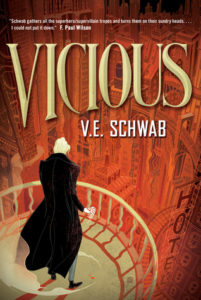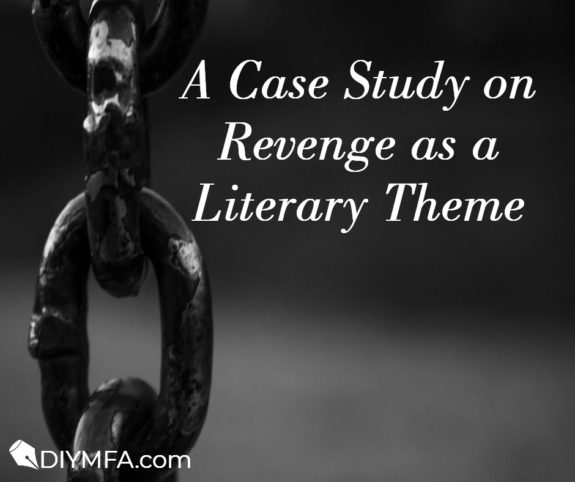Ah, revenge. It’s one of the classic literary masterplots, where the protagonist believes he’s been wronged and seeks to retaliate against the antagonist. But did you know that revenge can also be a literary theme? How it manifests through the plot and characters will depend on what kind of story the author wants to tell. But regardless of the protagonist’s motivations, his target, and the impact his pursuit has on other characters, all revenge tales shed light on the destruction resulting from the protagonist’s actions, from the loss of his morality to the price he and others may have to pay.
Sounds ominous, doesn’t it? But as we’ll see in today’s edition of Theme: A Story’s Soul, revenge makes for a fascinating case study. So let’s dive into the first of our two example novels and discover which storytelling elements and techniques can help us illustrate this dark, complex theme in our own work.
Revenge as a Theme in Emily Bronte’s Wuthering Heights (Gothic / Romance)
 Emily Bronte’s Wuthering Heights is the tempestuous tale of Catherine Earnshaw and her lover and foster brother Heathcliff. After enduring years of abuse under Catherine’s biological brother Hindley, Heathcliff runs away – only to return to Wuthering Heights three years later and find Catherine married to another man. He then begins a decade-long revenge scheme to try to bring down both the Earnshaws and their neighbors, the Lintons. But does his plan help him get what he truly wants in the end?
Emily Bronte’s Wuthering Heights is the tempestuous tale of Catherine Earnshaw and her lover and foster brother Heathcliff. After enduring years of abuse under Catherine’s biological brother Hindley, Heathcliff runs away – only to return to Wuthering Heights three years later and find Catherine married to another man. He then begins a decade-long revenge scheme to try to bring down both the Earnshaws and their neighbors, the Lintons. But does his plan help him get what he truly wants in the end?
The cycle of revenge doesn’t begin with Heathcliff, though. Instead, it ignites with Hindley. As a boy, Hindley grows increasingly jealous of the fondness Catherine and their father show the orphaned Heathcliff. Eventually Hindley views his father as “an oppressor rather than a friend” and Heathcliff as “a usurper of his parent’s affections and his privileges” (48) – a perceived threat, in other words, to Hindley’s inheritance of Wuthering Heights, the family estate. So when Hindley returns from college after his father’s death, he uses his new role as patriarch to debase Heathcliff, from denying him an education to forcing him to work in the fields, and to separate him from Catherine. His revenge appears complete when Catherine accepts Edgar Linton’s marriage proposal, explaining that “‘[i]t would degrade me to marry Heathcliff now’” despite how much she loves him (100).
So it’s no surprise that Heathcliff begins making his own plans. His desire for revenge often surfaces in the joy he experiences from his victims’ suffering. His delight in Hindley’s descent into alcoholism and gambling is apparent (82), and he uses those habits to his advantage by driving Hindley into debt. Heathcliff then shows the same merciless pleasure during his vengeance on Catherine’s husband Edgar Linton. At one point, he tells the Lintons’ daughter Cathy, “‘I shall enjoy myself remarkably in thinking [your father] will be miserable; I shall not sleep for satisfaction’” (337). This marks the moment when Heathcliff’s obsession with revenge pushes him beyond any hope of redemption. His lack of concern over harming the next generation of both families, including his own son, also proves how revenge affects anyone who cares about the vindicator or the victim, especially those who are used as pawns in the overall plot.
While Hindley and Heathcliff execute the two grandest schemes, other characters find equal satisfaction through smaller acts of vengeance. Catherine, for example, rebels against Hindley by becoming Heathcliff’s childhood co-conspirator, escaping with him to the nearby moors and contriving “some naughty plan of revenge” whenever they could (58). The most moving comeuppance, however, comes from young Cathy Linton, after she learns how Heathcliff has used her in his revenge against her father: “‘[Y]ou have nobody to love you; and, however miserable you make us, we shall still have the revenge of thinking that your cruelty arises from your greater misery’” (353). Even though Cathy’s anger is perpetuating the novel’s cycle of revenge, she still makes an excellent point: Despite all of Heathcliff’s maneuvers, he’ll never have Catherine’s love, the only thing he’s ever wanted.
Revenge as a Theme in V.E. Schwab’s Vicious (Fantasy / Superhero)
 In V.E. Schwab’s Vicious, two college roommates, Victor and Eli, experiment with the idea that near-death experiences can give someone ExtraOrdinary abilities. Their shared obsession soon lands Victor in jail and Eli on a mission to rid the world of all super-powered people except himself. When Victor escapes from prison 10 years later, his actions and choices for allies set him and Eli on a collision course that’s fueled by – what else? – revenge.
In V.E. Schwab’s Vicious, two college roommates, Victor and Eli, experiment with the idea that near-death experiences can give someone ExtraOrdinary abilities. Their shared obsession soon lands Victor in jail and Eli on a mission to rid the world of all super-powered people except himself. When Victor escapes from prison 10 years later, his actions and choices for allies set him and Eli on a collision course that’s fueled by – what else? – revenge.
Through flashbacks, readers learn that Eli turned in Victor to the police after Victor’s near-death experience results in, among other things, the accidental death of Eli’s girlfriend. Thus, the motivation for Victor’s revenge becomes clear, as well as the intensity of his desire. He rarely stops thinking about his target, even when trying to sleep (“… [W]hen he closed his eyes and searched for silence, a word rose up to meet him, a reminder of why he couldn’t afford to break, a challenge, a name. Eli.” [69]). He also views his accomplices (especially his fellow ExtraOrdinaries) as “weapons with minds and wills and bodies, things that could be bent and twisted and broken and used” (289). These and other instances in Vicious prove how the need for vengeance can border on obsession and erase a person’s humanity.
As for Eli, one could make the case that he avenged his girlfriend’s death by putting Victor in prison. But he also seeks a different kind of retribution as he hunts other ExtraOrdinaries. His falling-out with Victor convinces him that, apart from himself, ExtraOrdinaries are “an affront to nature, to God,” and that his rapid healing abilities are a sign that he is “stronger” than the others and must rid them from the world (220). Thus, Eli takes on what Victor later calls an “avenging angel” (353) role. Like the Biblical angels, Eli carries out what he perceives as divine justice through violence – in his case, by killing ExtraOrdinaries for the greater good.
Small acts of vengeance also punctuate the larger scheme in Vicious. Sydney, a teenage ExtraOrdinary, joins Victor’s cause after Eli almost kills her, and eventually finds herself hoping that Eli feels “sick” upon learning that she’s still alive (275) and says, “‘I hope Victor hurts him…. A lot’” (276). Victor also sees Sydney’s survival as a victory over Eli, explaining that her power of resurrecting the dead is valuable and that “‘[Eli’s] loss is my gain’” (225). Also, before his conflict with Eli, Victor enacts revenge against his neglectful parents, a pair of world-renowned spiritual teachers, by redacting lines of text from their self-help books for academic credit as well as for fun (14). All of this illustrates how seemingly insignificant moments can enhance the revenge theme – and how some characters develop their vengeful habits long before the story’s events take place.
Keys to Exploring Revenge as a Literary Theme
As you can see, stories that explore revenge as a theme typically make that theme central to the main conflict. Wuthering Heights would be rather boring if Heathcliff had forgiven Hindley and Edgar or moved on from his love of Catherine. The same goes for Vicious, if Victor had opted not to make Eli pay for his betrayal. So what other techniques and elements can reinforce the revenge theme, based on our new understanding of both novels? Here are a few to start with:
- “Revenge Cycles”: Wuthering Heights and Vicious use multiple examples and repetition – both of which are integral parts of exploring theme – to reinforce the infectious nature of revenge. As Heathcliff and Victor plot and pursue their vengeance, their actions spur their victims to retaliate, spawning a cycle of revenge in which characters go on hurting one another until they are unable or unwilling to continue for one reason or another.
- Character Motivations: Readers don’t simply know that Heathcliff and Victor want revenge. They also witness the events that spark each character’s desire for it. Making the birth of this motivation part of the story helps readers understand why a character is seeking vengeance while creating strong roots that allow the theme to keep growing.
- Grand Schemes vs Smaller Acts: Both novels feature a main revenge storyline punctuated with other acts of vengeance such as verbal threats or “ill wishes,” childish pranks, and small or symbolic victories prior to the climax scene. These seemingly less significant moments not only bolster the theme, but also fuel the revenge cycle between characters and enhance the overall grim tone.
- Impact on Other Characters: Did you notice how Heathcliff’s schemes against Hindley and Edgar include using their children as pawns? And how Victor’s plan to ruin Eli’s reputation also spells danger for their accomplices? Exploring revenge as a theme means showing how other characters get wrapped up in the pursuit (either by choice or by force) and how they are forever changed as a result of their involvement.
- The Cost of Revenge: A convincing examination of revenge as a theme will include evidence of the price one must pay for choosing revenge. Both V.E. Schwab and Emily Bronte use dialogue, internal thoughts, and interactions with other characters to show how their respective “heroes” have lost touch with their humanity. The end of each novel also shows whether the protagonist gets what he wants (in Heathcliff’s case, he doesn’t) and what that pursuit has cost him (in Victor’s case, his own life).
Now It’s Your Turn!
- What are some of your favorite revenge stories? How do they explore revenge as a theme and not just as a type of plot?
- Write a story in which the protagonist seeks vengeance. Why does the protagonist believe he’s been wronged? What could his obsession cost him in the end? How might his actions spur other characters, including his victim, to retaliate against him?
- Revenge doesn’t only happen in fiction and movies. What real-life examples of “getting payback” can you think of? How would our Keys to Exploring Revenge as a Literary Theme apply to each case?
What topics would you like to see featured at Theme: A Story’s Soul? Share your thoughts by commenting below or tweeting me at @SaraL_Writer with the hashtag #DIYMFA.
 Sara Letourneau is a speculative fiction writer and poet in Massachusetts who devours good books, loves all kinds of music, and drinks copious amounts of tea. In addition to writing for DIY MFA, she is a Resident Writing Coach at Writers Helping Writers and is hard at work on a YA magical realism novel. She also freelanced as a tea reviewer and music journalist in the past. Her poetry is forthcoming in Canary; and has previously appeared in The Curry Arts Journal, Soul-Lit, The Eunoia Review, Underground Voices, and two print anthologies. Visit Sara at her personal blog, Twitter, and Goodreads.
Sara Letourneau is a speculative fiction writer and poet in Massachusetts who devours good books, loves all kinds of music, and drinks copious amounts of tea. In addition to writing for DIY MFA, she is a Resident Writing Coach at Writers Helping Writers and is hard at work on a YA magical realism novel. She also freelanced as a tea reviewer and music journalist in the past. Her poetry is forthcoming in Canary; and has previously appeared in The Curry Arts Journal, Soul-Lit, The Eunoia Review, Underground Voices, and two print anthologies. Visit Sara at her personal blog, Twitter, and Goodreads.







